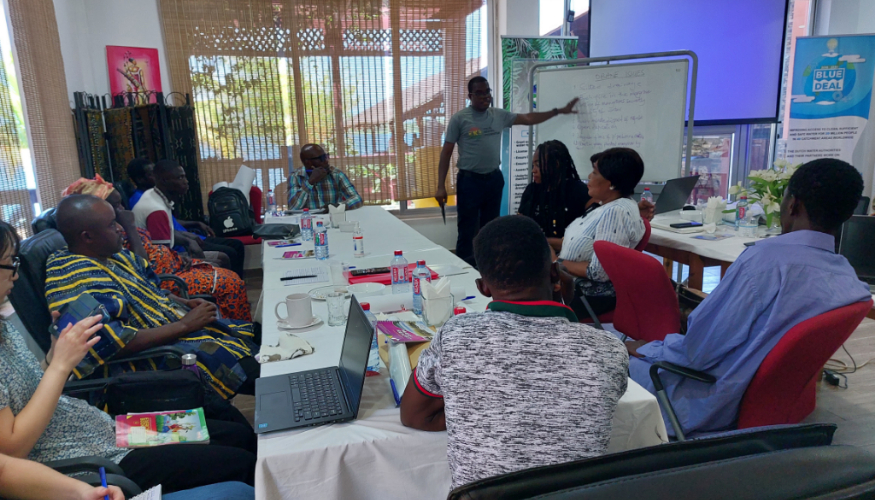In March, the Blue Deal Ghana team went on a work visit for 2 weeks to meet with many new stakeholders outside the water sector. By meeting stakeholders outside the water sector, the Blue Deal Ghana is trying to get water challenges higher on the political agenda.

The goal of these meetings is to work together with other partners, besides the Water Resources Commission (WRC), and to connect the water themes to other relevant themes. In this way, the water challenges will come higher on the political agenda. The project team met with partners such as the Ministry of Environment, Science, Technology & Innovation (MESTI), the Hydrological Authority (HYDRO), the Ministry of Works and Housing (MWH) and the Environmental Protection Agency (EPA).
Regional: bottom-up
During the visit in March, the project team started with the implementation of the Area Oriented Approach in the Songor Lagoon in the south of Ghana. An Integrated Water Resources Management plan for the Lower Volta Basin is almost completed by the WRC and the area of the Songor Lagoon is selected as a pilot area to start the implementation of the overall plan. A big challenge in this area is mangrove depletion.
However, the area faces many more water related challenges. For this reason the Ghanaian and Dutch team shared knowledge on conducting an Area Oriented Approach and guided in the process of starting it. During a workshop with around 45 stakeholders from the area (such as representatives of the communities, the Forestry Commission and NGO’s) different cohesive issues were brought up and concrete actions to solve these issues were identified. In this way the pilot project will have a more multidisciplinary and holistic approach. The water challenges in the Songor area are now brought bottom-up to the political agenda of the WRC.
Next to this, the Blue Deal met with the governor of the Upper East Region to talk about the water related challenges in the area. The main outcome is that water themes will be scheduled during regional meetings with for example District Assemblies, chiefs and subbasin committees.
National
To get the water challenges higher on the political national agenda the project team met with many new stakeholders during the work visit. The goal is to work together with other national partners, and with the WRC, to connect the water themes to other relevant themes. The Delta programme that we have in the Netherlands is of great interest for Ghana, since the country faces many challenges in the Lower Volta Delta and along the whole coast. Therefore, the Blue Deal team endorses to set up a Delta programme. For this reason the team met with MESTI, WRC, HYDRO, MWH and EPA to assess the challenges in the Delta and strengthen the cooperation in the future.
Next to this, the Blue Deal team had several meetings with the Netherlands Commission of Environmental Assessment (NCEA). They came with the Blue Deal team to Ghana to address their work on a national level and start the cooperation in current and new programmes, policies and plans (such as land use plans or water catchment plans). Their aim is to ensure that the environmental and social consequences of proposed activities are incorporated into decision making, through an inclusive process. Together with the Blue Deal team the NCEA met with the EPA.
The connection of the EPA and the Blue Deal team secures the holistic approach of water resources management within the work of the EPA. In the near future the NCEA will provide independent advice through Strategic Environmental Assessments (SEA) for the catchment plans of the WRC and will provide guidelines and training to work on capacity development of SEA with the WRC, EPA and other involved stakeholders.
Another example of making sure water challenges are of more importance on a national level, the Dutch team assesses climate issues like reforestation. In the Bongo District a successful reforestation project is already set-up. In this way the Blue Deal becomes more relevant to the Dutch Embassy, which for their part have influence on a national level.
Transboundary cooperation
Ghana faces many water related challenges that they can not solve all by themselves. Therefore, the cooperation of Ghanaian and Dutch water partners also supports to look on a transboundary governance level for cooperation and effective solutions. Such as the sand motor that is now set-up in Benin to protect the coast from further erosion. In the next few months a broad delegation of the Ghanian partners will visit this project to explore the options for their own coastal protection. Small scale cooperation between the partners along sub catchments that are part of as well Burkina Faso as Ghana should also gain more attention in the Area Oriented Approach of the Blue Deal programme in the Upper East Region.
